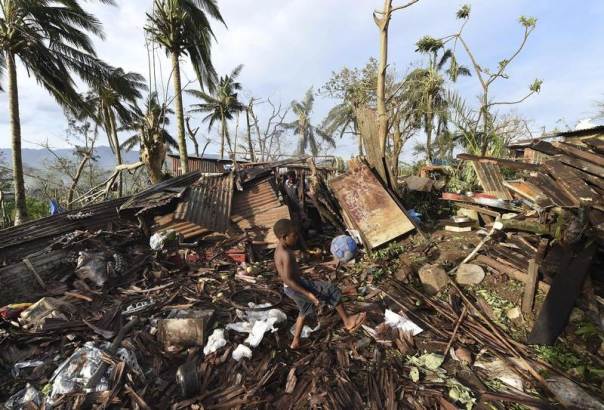A coalition of vulnerable countries is pushing the global community to adopt a new 1.5 degree global warming target at the ongoing climate talks in Paris.
The group of countries, known as the Climate Vulnerability Forum, argues current efforts to limit global temperature rise to two degrees Celsius is insufficient to protect many nations from the dangers of climate change. The group came to this conclusion, which was announced on the first day of the climate talks, after two years of expert review and diplomatic consultations.
The groups said lives, rights and the prosperity of billions are at stake in the globally agreed temperature limit.
The two degree limit has been widely cited since the Stockholm Environment Institute released a major study on dangerous climate change in 1990. The limit did not become a formal target of global climate negotiations until 2010 with the signing of the Cancun Agreement.
For a more detailed backgrounder on the two degree target, read Carbon Brief’s “Two Degrees: The History of Climate Change’s Speed Limit.”
Thoriq Ibrahim, Maldives minister of environment and energy, said the danger of exceeding a 1.5 degrees target is “especially acute for the Alliance of Small Island States (AOSIS), a group of 44 low-lying island and coastal states from around the world.”
“AOSIS is of the view that the Paris agreement must be an ambitious, legally binding protocol capable of limiting warming to below 1.5 degrees Celsius,” he said, adding “immediate action is required before the treaty goes into effect in 2020 if we are to keep the window to 1.5 degrees open.”
Recently Cyclone Pam and Typhoon Maysak destroyed homes and killed dozens of people in Vanuatu, the Solomon Islands, Tuvalu, Kiribati and in Micronesia, Ibrahim said.
“What’s worse, scientists expect climate change to make weather events like these far worse in the Pacific and oceanic regions worldwide, unless bold action is taken immediately.”
“Warming has now reached 1C,” the island nations said in a statement. “At the same time, our islands are experiencing the impacts of an ongoing extreme El Niño and the science is telling us that such events will occur twice as often over the 21st century if we do not act strongly and decisively. Additional magnitudes of warming will only increase the risk of such severe, pervasive and irreversible impacts.”
On Monday the island nations along with the coalition of vulnerable countries pressed the global community and France, the host of this year’s climate summit, for a binding treaty that limits warming to 1.5 degrees. The group also called for complete global decarbonization by 2050.
French foreign minister Laurent Fabius indicated France is open to adjusting the agreement to accommodate the 1.5 degree target.
“This agreement will need to be differentiated, fair, sustainable, dynamic, balanced and legally binding, and will need to ensure that … the global temperature does not rise by 2C — or even 1.5C — compared to the pre-industrial era because of greenhouse gas emissions,” Fabius said.
“Each of these terms refers to specific provisions on which we have been unable to conclude fully in the past.”
“We refuse to be the sacrifice of the international community in Paris. Anything that takes our survival off the table here is a red line,” Anwar Hossain Manju, Minister of Environment of Bangladesh, said on Monday.
Ethiopia State Minister of Environment, Forest and Climate Change Kare Chawicha added, “climate change does not affect us equally. Those countries which have contributed least to the problem are often affected the most. We are here to cooperate. We are here to share experiences.”
Canadian Federal Green party leader Elizabeth May said she hopes Canada will join efforts to implement the 1.5 degree target.
“I think I t would be helpful for Canada to say the world can stabilize at 1.5 degrees,” May said.
Saleemul Huq, director of the International Centre for Climate and Development, told reporters Tuesday the difference between a temperature increase of 1.5 degrees and two degrees “is roughly 1.5 million people who will fall through the cracks and most of them will be in vulnerable and developing countries.”
Huq said a recent assessment of the two degrees target found it will fail to protect some people, countries and ecosystems.
“The 1.5 degree target is endorsed by 106 countries,” Huq added. “That makes them a majority of UNFCCC which is just over 150 countries. If this was a democracy they would win.”
“But unfortunately these are not very powerful countries,” he said.
“The pushback we get is that [the 1.5 degree target] is unrealistic.”
Huq added that current national climate commitments are projected to increase global temperatures by three degrees.
“It will be difficult. But difficult is not impossible,” Huq said.
We believe there is sufficient technology and money. There is insufficient political will. We have 13 days to generate that political will.”
The Climate Action Network, a group representing more than 950 non-governmental organizations worldwide, welcomed the call for a strengthened target.
“If our goal is not to secure the survival of whole countries, then what is it?” the group stated.
“This is a simple moral imperative that should unite us all.”
Subscribe to our newsletter
Stay up to date with DeSmog news and alerts






